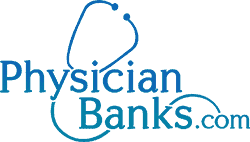Mortgage Loans for Physicians
Practicing physicians have alternative options to a conventional mortgage with some pretty attractive features. These kinds of loans include no PMI, a more generous debt-to-income ratio allowance, little to no work experience record requirements, and 0% to 10% down-payment obligations.
Read more about what a physician loan is, how it works, whether its advantages outweigh traditional lending options, know if you qualify for one, and where to find a physician loan that’s suitable for your individual needs.
What is a Physician Loan?
Physician loans are offered exclusively to practicing physicians and dental professionals, veterinarians, podiatrists, optometrists, and sometimes even attorneys. Typically, new graduates with extensive amounts of medical school debt tend to take advantage of the physician loan opportunities available. They offer the chance to get a home mortgage after finishing extended education and training while considering and making specific allowances for medical school debts.
Unique to physician loans is the fact that there is no requirement for private mortgage insurance, or PMI, which is standard for traditional loans where the borrower provides a low or no down payment. Those who aim to purchase a home often set the goal to have 20% down before heading to the bank to avoid the additional charges associated with PMI.
Doctors don’t necessarily have that opportunity while giving so much time to medical studies. Depending on the final loan amount, eliminating the PMI can save doctors hundreds of dollars from monthly mortgage payments while pursuing medical careers.
Understanding the Advantageous Features of a Physician Loan
Traditional loans and physician loans have three main differences. Those differences are advantages for the medical professionals who decide to take this route when purchasing a home through a lender.
Debt-to-income ratio: Debt-to-income ratio, or DTI, is something that lenders look at to determine the reasonable ability the borrower has to pay back the debt they have and include adding on another mortgage payment. Those who already have a high DTI are looked at as being higher risk and are less likely to be approved.
For doctors who have just graduated from medical school, there’s a good chance that there is an enormous amount of debt coming with them unless they were independently wealthy or earned a massive amount of scholarships. On average, when a general practitioner graduates from college, he or she will walk away with a degree and a hefty $200,000 in student loan debt to go with it.
Doctors often have difficulty working with conventional financial institutions during residency and internship because the monthly payments they’re making for repaying student loans are already taking up most of the income they’re earning. Despite the fact that the future looks bright in terms of revenue for medical professionals, DTI will make it challenging to get a regular mortgage loan.
Physician loan programs take the student loan debt out of the equation, making it a lot more manageable to get through the application and approval process.
Proof of employment: Before a lender will even consider a loan application for borrowing out money, one of the first specifics they look for is employment and its length. Most financial institutions will deny people with less than two years of consistent work with the same employer. Those who have jumped from job to job, regardless of how long they have been working, are also considered a higher risk. There isn’t much confidence that a person will keep their income coming in after the loan is approved.
For doctors just making the transition from medical school, they’ve spent the last several years, or perhaps even a decade learning. It’s a job in itself, but there is no compensation. Employment history isn’t solid if there is anything there to look at, period. Banks will look at the lack of consistent income and deny the applicant based on that alone.
With physician loans, lenders can approve applications for doctors that can show a residency contract, even if they haven’t actually started working yet. It’s a loophole for physicians that haven’t had the opportunity to enter the workforce yet. Still, the likelihood they will remain gainfully employed soon and well into the future is present with the contract.
Private mortgage insurance: Private mortgage insurance, or PMI, is the mandatory insurance added to loans either privately or through the government. It’s necessary when less than 20% of the borrower’s total mortgage amount is given as a down payment.
The purpose of PMI is for the mortgage company’s protection from borrows that default on their payments putting the property into foreclosure. The range for PMI falls between 0.5% and 1% of the total mortgage cost annually, and most lenders will add the charge to monthly payments. When the borrower pays off the 20% of the principle required, the PMI is eliminated.
Depending on the loan’s size, a quick calculation shows that the PMI charges can cost hundreds of extra dollars per month. Physicians loans don’t require the 20% down payment for this PMI to be omitted from the loan, and it’s standard not to be included.
Do You Qualify for a Physician Loan?
The qualifications for a physician loan are pretty straightforward. The programs require borrowers to hold an M.D. or D.O. degree. Other degrees that may work for some loan programs include D.P.M degrees, or D.D.s or D.M.D., dentist and orthodontic credentials.
Banks recognize that becoming a professional in the medical field requires time, whether a doctor, dentist, or another expert. It’s a process with many stages, and the circumstances of the loan may vary based on the length of time spent in career training and development programs. For example, interns, fellows, and residents won’t get the same maximum loan amount as an attending physician.
Refinancing or purchasing a primary residential property are the only situations where a physician mortgage loan can be used. Borrowers do not qualify to obtain these kinds of loans for things like second properties or vacation homes. For physicians looking to purchase two, three, or four-unit buildings, the loan may be applicable, but only if the borrower intends to make one of the units their primary residence.
Comparing the Pros and Cons of Physician Loans
Now that it’s been brought up a few times, it’s evident that the most significant advantages of getting a physician loan rather than a traditional mortgage is the fact you can do so without being required to pay the PMI costs, regardless of how much money is presented as a down payment.
For professionals that can afford to get the conventional mortgage options out there because they have a 20% down payment, it’s better to go that route and skip the physician loan opportunities.
Like with almost all situations in life, some disadvantages come along with a physician loan:
- Interest rates are generally higher for physician loans than they are for conventional mortgages.
- Some doctor mortgage lenders are very specific about who they will consider eligible for their physician loans. (new residents, new attendings with 7-10 years out of residency or less, or dentists only)
- There may be restrictions on the type of property that’s allowed to be purchased, including excluding structures like condos.
- Doctors might be required to open a bank account so that auto-payments can be made through the lender-provided checking or savings account.
- May demand proof of cash reserves that equal out to a certain number of months of mortgage payments, a good credit score, and a debt-to-income ratio lower than 38%, despite any student loan debt.
Banks and lenders are generally going to juggle whatever they have to to provide a suitable loan to doctors that walk into their building. Why? Because these professionals have a very minimal chance of defaulting on their loan, with 0.2% being the average and way lower than a typical borrower.
Additionally, they want medical professionals to build long-term relationships with their organization. That means coming back for investment purposes, checking and saving accounts, insurance, and other estate needs. Many of the lenders will treat their medical professional clients superiorly with hopes that he or she will refer some of their co-workers to them as well.
Should You Get a Physician Loan?
In short, if you’re looking to get a mortgage and you’ve recently graduated from medical school, you’ve more than likely got a mountain of college debt following you. If you’re happy renting your residence, then you can skip the entire thought of a mortgage altogether. However, if you’re ready to become a homeowner, you have to start considering your options.
Physician loans are excellent for medical professionals who have spent most of their 20s and 30s working through school, internships, and other training that are ready to get out from a monthly rental payment and start investing in their futures. If you have 20% down to put on your dream house, you don’t need a physician loan. If you’re trying to play catch up, this allows you to start paying for your primary residence without worrying about job experience or debt-to-income ratio.
Finding a Physician Loan
There are a plethora of lenders that offer physician loans. It’s the best idea to start with a financial institution that you’re already familiar with. The likelihood you get a smoother experience with a lender you have an existing relationship with is much higher than if you were to start over from scratch.
If you don’t have a bank that you’ve been working with, there are many choices available online and likely in your town or a city nearby. Be sure to examine each one and make comparisons before signing any contracts. Check for the best interest rate and other terms of the loan that fit your repayment responsibilities expectations.

